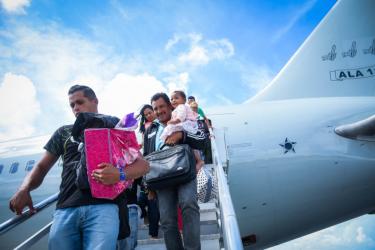Critical Migration Governance Issues in a Changed World
|
|
While the Global Compact for Safe, Orderly, and Regular Migration adoption process has concluded, critical work remains to be done at the national, regional, and global levels to implement its commitments and examine the complementarity and gaps the compact has with the related Global Compact on Refugees.
A partnership between the Migration Policy Institute (MPI) and the Deutsche Gesellschaft für Internationale Zusammenarbeit (GIZ) GmbH, with GIZ commissioned by the German Federal Ministry for Economic Cooperation and Development (BMZ), has resulted in a series of publications aimed at enriching the conversation around the implementation of the compact. These publications, which can be found below, are intended to generate new knowledge and policy guidance in the following areas: the global architecture of migration governance, return and reintegration, and south-south migration.
This research builds on a previous project between MPI and GIZ that sought to inform global compact deliberations and debates on the implementation of the United Nations' Sustainable Development Goals. For more information on that project, click here.
Will International Migration Governance Survive the COVID-19 Pandemic?
The COVID-19 pandemic poses a range of (im)mobility challenges that the international community has few tools to address. This policy brief examines the valuable guidance offered by the Global Compact for Safe, Orderly, and Regular Migration on short-term emergency response and the longer-term reopening of international migration. It also considers how the pandemic is affecting the relationship between migration and development.
The Divergent Trajectories of the Global Migration and Refugee Compacts: Implementation amid Crisis
National governments and UN agencies have been working to implement the Global Compact on Refugees and the Global Compact for Safe, Orderly, and Regular Migration. Where has the most progress been made as the compacts hit the two-year mark? And how has the process played out differently for the two pacts? This policy brief explores these questions, the growing divergence between the pacts, and how challenges such as the COVID-19 pandemic are shaping implementation.
Rewiring Migrant Returns and Reintegration after the COVID-19 Shock
Migrant returns and reintegration have been the subject of intense international debate in recent years, and the COVID-19 pandemic has added an extra layer of complexity as millions of migrants have been expelled or returned voluntarily. This policy brief explores the effects of the pandemic on migrant returns, reception, and reintegration, and how countries of origin and destination can improve their policies and partnerships going forward, with a focus on sustainable reintegration.
EU Strategy on Voluntary Return and Reintegration: Crafting a Road Map to Better Cooperation with Migrants’ Countries of Origin
In its first EU Strategy on Voluntary Return and Reintegration, the European Commission sets out principles to increase the number of voluntary returns, make the return process more dignified, and provide better support to returnees. To make good on these goals, EU countries will need to improve their cooperation with migrants’ countries of origin. This policy brief explores opportunities to build this cooperation.
From Unilateral Response to Coordinated Action: How Can Mobility Systems in Sub-Saharan Africa Adapt to the Public-Health Challenges of COVID-19?
The COVID-19 pandemic challenged public health and migration management infrastructures in sub-Saharan Africa, as never before. It revealed important lessons about how countries in the region could adapt mobility systems in ways that protect public health while also allowing people to safely access work, humanitarian protection, and their communities.
Deepening Labor Migration Governance at a Time of Immobility: Lessons from Ghana and Senegal
The pandemic has dramatically curtailed labor migration opportunities in West Africa, as it has around the world. What does this mean for countries such as Ghana and Senegal that have been working to improve their governance of international labor migration? This brief explores the evolution of these countries’ migration policies, efforts to facilitate labor migration, and strategies to engage their diasporas.


